Religion in ancient Greece. Gods. Part two.
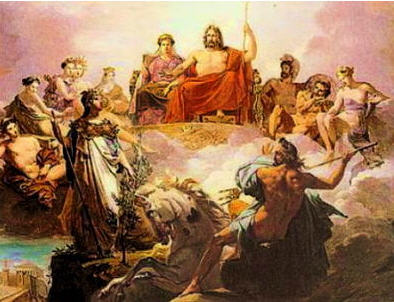
Continues the story of the gods of the Greek pantheon, the first part can be read here. And the second part will begin with one of the most famous Greek goddesses – Aphrodite beautiful (or Venus)
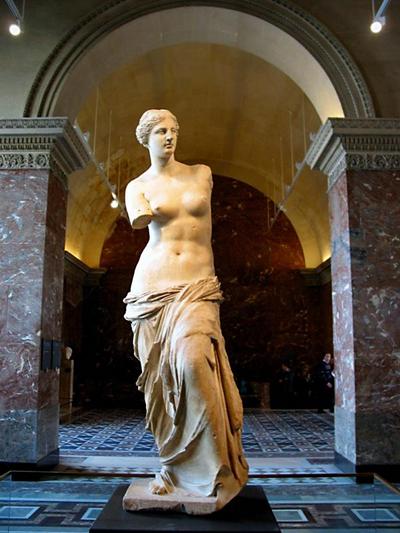
Aphrodite – the goddess of love and passion. The most beautiful of all the beautiful Greek goddesses. (True Hera and Athena did not think so, do not like the beautiful goddess Aphrodite for her beauty) But none of the men, whether individuals or gods can not resist her amazing beauty. Many gods sought her love. According to legend, Aphrodite was born from the sea foam on the picturesque island of Cyprus. (From that it is called Kipridy)
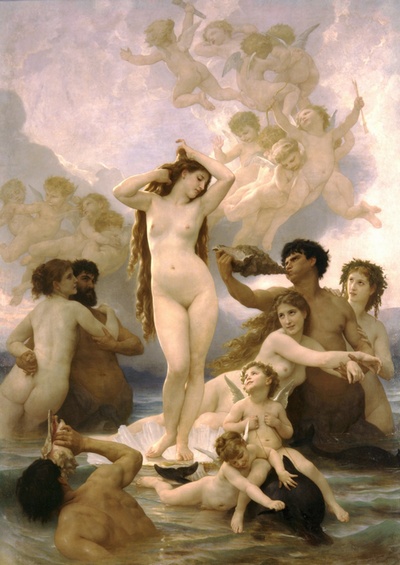
This painting by William Bouguereau, it depicts the birth of the beautiful Aphrodite.
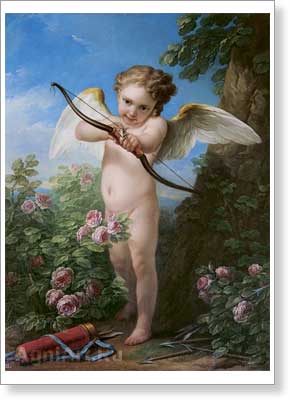
Anyone familiar lovely son of Aphrodite, the impish Cupid (also known as Cupid, or Eros)
This Angel with wings and a bow, as a shot in the heart, so it is immediately love breaks. The objectives of Eros were not only mortals, but the immortal gods. So once naughty Cupid shot the god Apollo, because he showed off his archery than insulted Cupid. Apollo fell in love with the beautiful nymph Daphne with all the divine passion, but Daphne did not like it. Desperate to escape, she began by Apollo, and to avoid his company turned her into a laurel tree, which became sacred by the ancient Greeks, especially in the cult of Apollo. As you can see, and the Greek gods suffer from unrequited love.
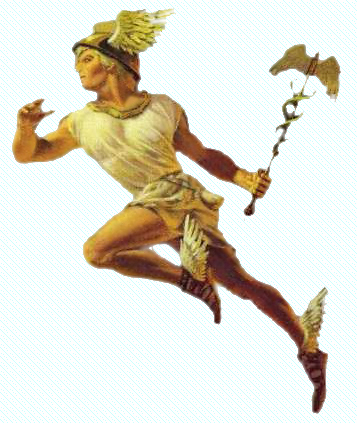
And here is another hugely popular Greek god – Hermes. Once known as Mercury, this fellow is familiar to many Lviv as a sculpture in one of the old houses in the center of Lvova1.
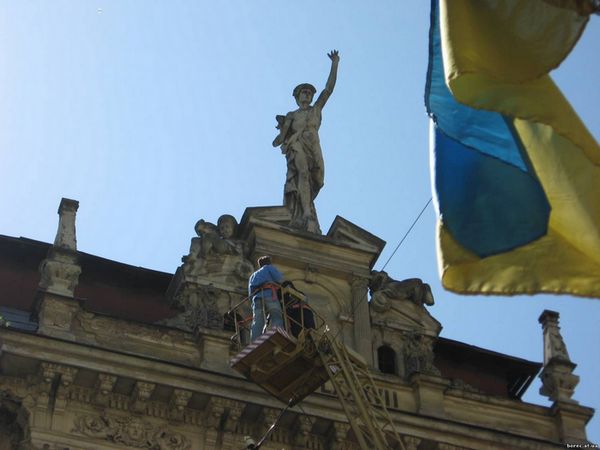
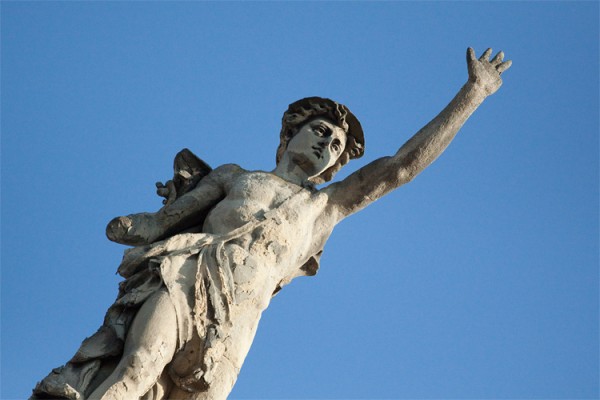
Hermes – messenger of the gods, often depicted with winged sandals and a winged helmet, thanks to which Hermes can instantly, at the speed of thought, be transferred to any part of the world. Such a useful skill it makes Hermes very helpful to Zeus, which is often delegated to it by the various orders and messages. Hermes – senior “which will be sent to” Olympus. Still, the legend Hermes from an early age had a very lively and restless character and liked to do different pranks. There is a very interesting Greek myth, which describes how the Hermes stole a small herd of cows from Apollo. Only when Apollo pinned him to the wall, he had to return the cows. In general, Hermes loved to pull all that is bad. Once, as a joke, he even stole his scepter of Zeus. Hermes is the patron saint of merchants, artisans and thieves. (And the bankers who are sometimes too little thieves, knowingly Lviv house with a sculpture of Hermes is a bank)
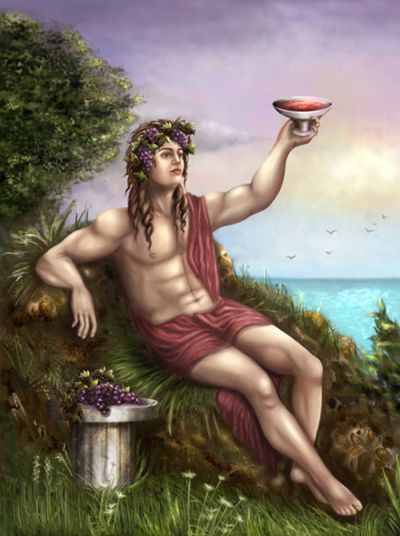
Very interesting is the god Dionysus. Dionysus in Greek mythology the god of wine and drunkenness, more known under the name of Bacchus, from him there is such a thing as an orgy. Now the word is synonymous with debauchery, but once upon a time considered to be one orgy of the ancient Greek mysteries, dedicated to the god Dionysus. First they were secret and only women were allowed to them. Then they began to be accepted, and the men and the mysteries themselves degraded. In fact, the essence of the mysteries of Dionysus during the cultural decline of ancient culture was the fact that the ancient Greeks were going to a fun company and drunk. If we go with someone for a beer – it can also be viewed as a little Dionysian mystery. Himself as Dionysus in Greek myths often described as a drunken god. Song: “Forever young, forever drunk” just about it.
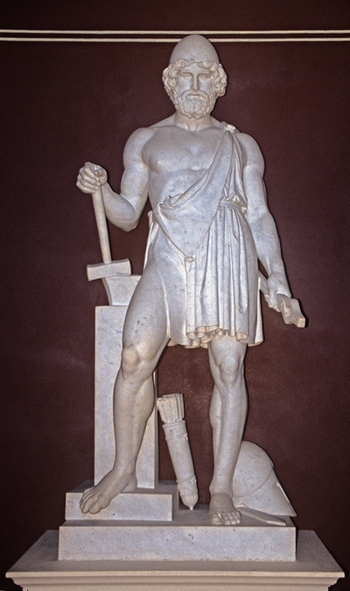
Very important is the god of Greek mythology Hephaestus. According to legend, Hephaestus was the son of Zeus and Hera, but was born very weak and lame. Hera, when she saw who she was born, so immediately he threw his frail son off at sea. Sea nymphs spared a young child and gave him shelter in one of the sea caves. Hidden Hephaestus great insult to his mother Hera.
When he grew older, he became very skilful blacksmith hammering amazing things of gold and silver. One day, he sent a gift to Olympus for Hera beautiful throne. Hera was delighted with the gift, but as soon as he sat on the throne, so just come from somewhere iron chains and tightly chained Hera to the throne. Gods rushed for help, but despite all their efforts, none of them could free from the shackles of Hera. It became clear that only one Hephaestus can release it. Immediately sent Hermes to Hephaestus. But how many Hermes is not persuaded Hephaestus to free Hera, who stubbornly did not want to do that. Then they sent to the aid of Hermes drunken Dionysus, god of wine, who brought with him a barrel of fine wine. Hephaestus, Hermes and Dionysus, as they say, “realized for three”, drank wine, Hephaestus drunk and did not remember resentment at Hera, Hermes flew on Olympus and freed from the shackles of Hera. After that he settled Hephaestus to Olympus, where he became the chief builder, built the magnificent royal palaces of Zeus and the other gods.
At the end of the second part.